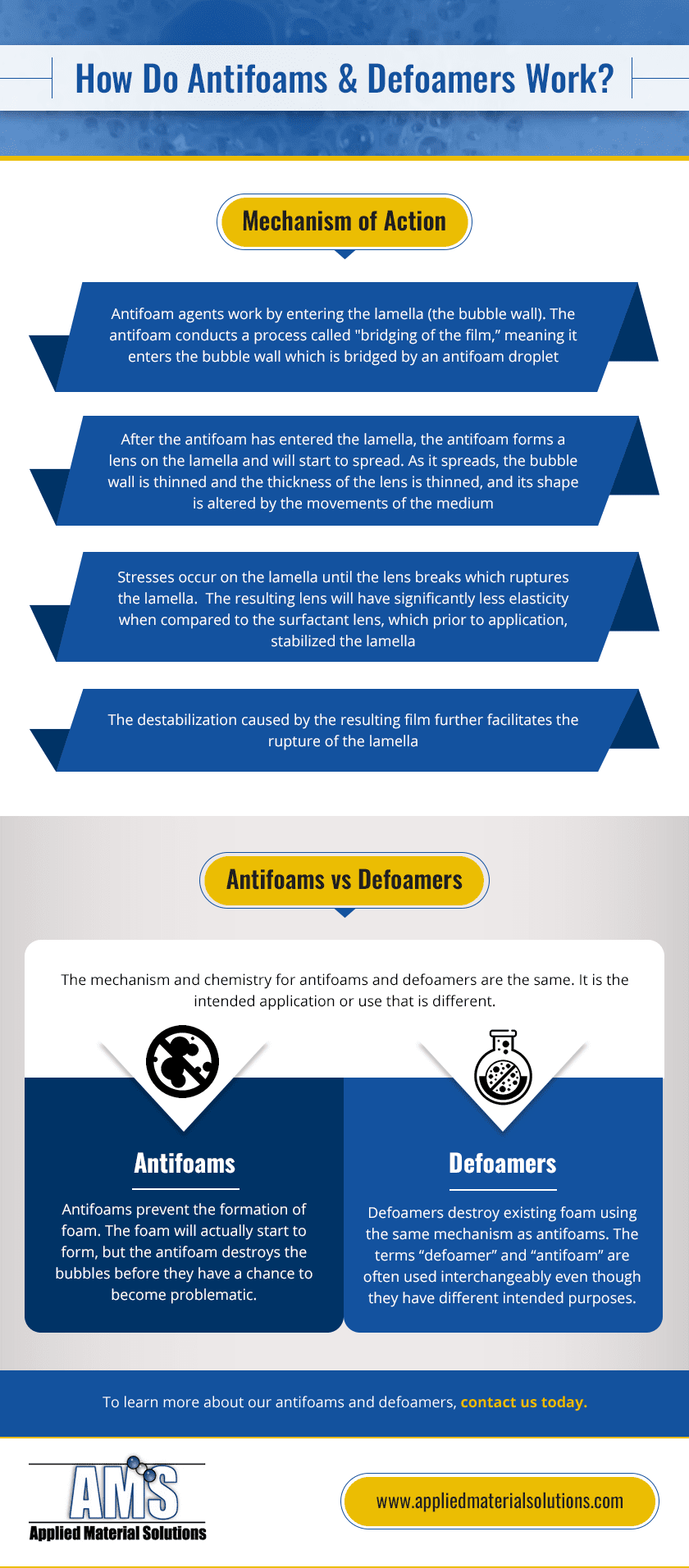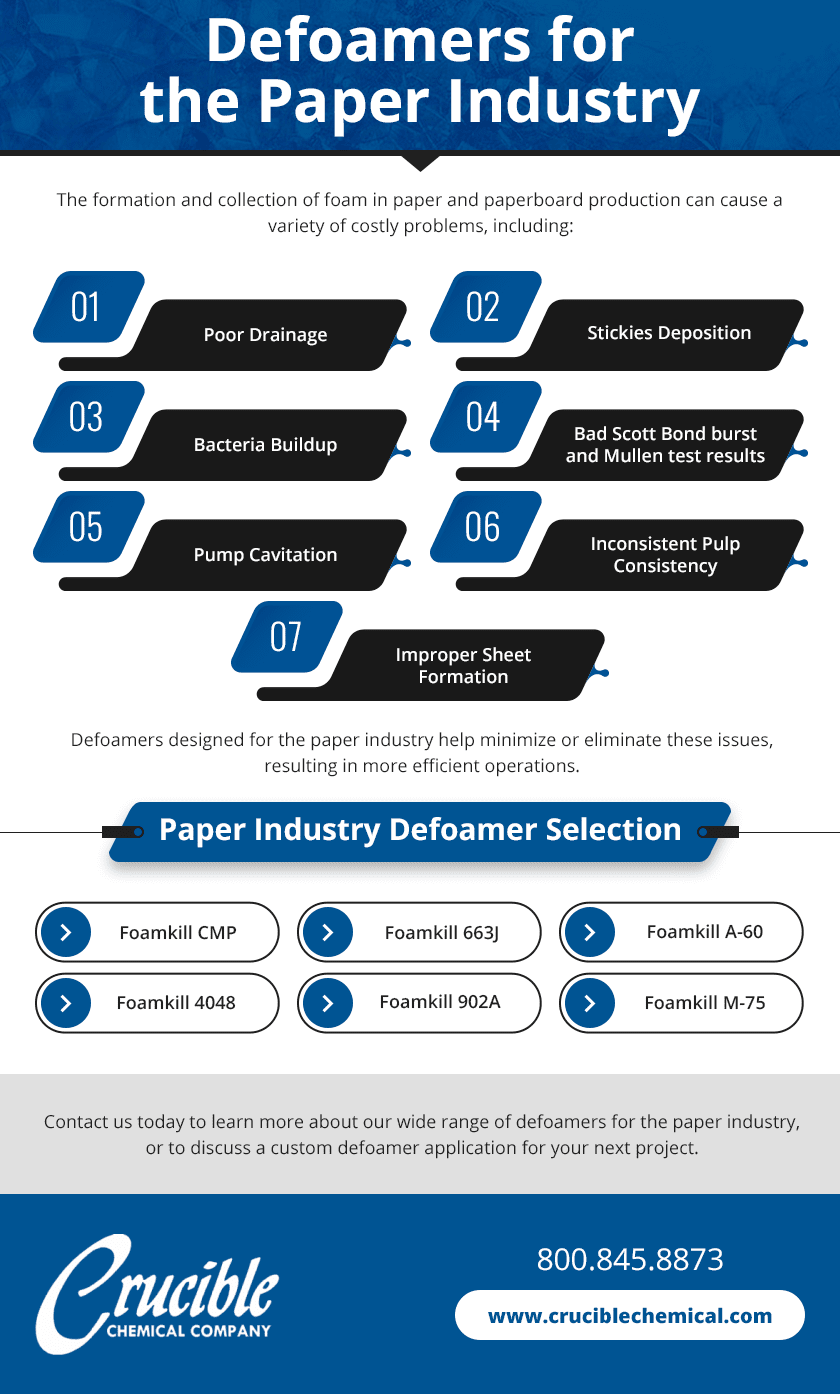How Defoamers Help Improve Performance in Coatings and Paints
How Defoamers Help Improve Performance in Coatings and Paints
Blog Article
The Role of Defoamers in Enhancing Product High Quality and Efficiency
Defoamers offer as vital ingredients that mitigate this problem, making sure smoother production process while enhancing the visual and practical qualities of the final items. The option of the ideal defoamer can be important to achieving ideal outcomes, increasing important inquiries regarding formula compatibility and efficiency metrics that merit more expedition.
Comprehending Defoamers
Comprehending the role of defoamers is crucial for keeping product top quality throughout numerous sectors. Defoamers are chemical ingredients created to stop the development and reduce of foam in liquid systems, which can adversely impact procedures such as mixing, filling up, and surface stress. Frothing can cause ineffectiveness, item problems, and compromised visual appeal, making defoamers a vital component in producing operations.
In commercial applications, defoamers assist to improve item uniformity and stability. In the paint and finishes market, foam can conflict with the application procedure and the last surface. In food and beverage manufacturing, extreme foam can hinder bottling and product packaging performance. The reliable usage of defoamers not just guarantees smoother manufacturing procedures yet likewise contributes to premium product performance.
In addition, the choice and formulation of a defoamer have to align with certain application requirements, such as compatibility with various other ingredients, performance under differing temperature level and pH problems, and prospective governing constraints. Ultimately, recognizing defoamers' functions and their value in various formulas is vital for enhancing production and guaranteeing the finest quality final product.
Sorts Of Defoamers
Defoamers can be categorized into several types based on their composition and device of action. The primary types include silicone-based, non-silicone organic, and not natural defoamers.
Silicone-based defoamers are among one of the most efficient, primarily due to their capacity to spread out swiftly on the fluid surface area and disrupt foam development. Their special chemical framework enables exceptional stability, making them suitable for high-temperature applications and environments with varying pH levels.
Non-silicone organic defoamers, commonly made up of natural oils or fatty acids, are valued for their biodegradability and reduced toxicity. These are usually utilized in food and drink applications where safety and security and environmental impact are critical.
Not natural defoamers, that include compounds like talc or calcium carbonate, act by raising the thickness of the liquid, thus lowering foam security. They are often utilized in commercial processes where compatibility with other products is not a worry.
Each kind of defoamer has distinctive benefits and restrictions, enabling for tailored services depending upon the particular foaming issues run into in numerous applications. Comprehending these differences is important for enhancing performance and attaining preferred product high quality.
Applications Throughout Industries
Many sectors leverage defoamers to enhance item top quality and operational performance. In the food and beverage field, defoamers are vital in processes such as developing and dairy products production to avoid foam formation, which can lead to ineffectiveness and product inconsistency. By managing foam, suppliers can guarantee better yield and a much more consistent product.
In the pharmaceutical market, defoamers play an important duty in the formula of liquid medications, where extreme foam can hinder blending and precise application. Their usage aids maintain look at more info the integrity of the solutions and promotes smoother production processes.
The paint and coatings sector additionally relies upon defoamers to boost the performance of items throughout application. By decreasing foam, these ingredients make sure a smoother surface and boost the aesthetic qualities of the end product.

Benefits of Making Use Of Defoamers
While the application of defoamers differs throughout industries, their advantages continually improve product high quality and process efficiency. One substantial advantage is the reduction of foam formation throughout manufacturing procedures, which can otherwise bring about production delays and incongruities in item top quality. By reducing foam, defoamers make it possible for a smoother circulation of materials, promoting extra effective operations and decreasing the likelihood of tools malfunctions.
Additionally, using defoamers can enhance the appearance and structure of end products. In sectors such as layers, paints, and food processing, too much foam content can endanger the visual looks and total quality, while the appropriate defoamer application makes certain an uniform surface and preferable qualities. Defoamers can contribute to cost savings by lowering waste during production and maximizing the use of raw products.

Choosing the Right Defoamer
Picking the best defoamer is vital for optimizing manufacturing processes and making certain product quality. The selection of defoamer affects not only the performance of foam control but also the general efficiency qualities of the end product. Elements to think about consist of the type of application, the chemistry of the formulation, and the environmental conditions under which the item will be utilized.
Different industries might need particular defoamer kinds, such as silicone-based, natural, or polymeric defoamers. Understanding the compatibility of the defoamer with the primary components is important to avoid adverse reactions that might jeopardize item stability. Furthermore, the defoamer's effectiveness in various temperatures and pH degrees must be examined to make sure constant performance.
Checking the defoamer in small applications can give useful insights into its efficiency and suitability. Consideration of governing conformity, specifically in food, drugs, and cosmetics, is paramount in choosing a defoamer. Inevitably, a thorough evaluation of these variables will certainly lead to the option of a defoamer that not just regulates foam effectively but likewise boosts the quality and performance of the end product.
Final Thought

In final thought, defoamers are necessary additives that substantially improve product top quality and efficiency across various industries. By successfully decreasing foam development, these agents not only improve functional effectiveness however likewise add to the visual and practical honesty of products. The calculated option and application of defoamers lead to cost financial savings, enhanced resource use, and increased client fulfillment. Overall, the value of defoamers in commercial procedures can not be overemphasized, as they play an essential role in attaining constant and high-grade end results.
Frothing can lead to inefficiencies, item defects, and compromised aesthetic allure, making defoamers a vital part in making procedures.

Report this page